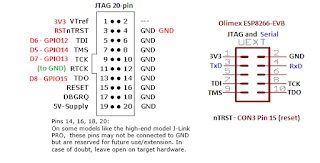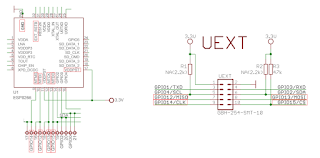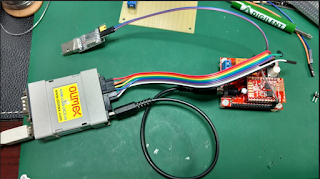However, I've been interested on getting JTAG ESP8266 hardware debugging working in Visual Studio using the Sysprogs VisualGDB add-in - with mixed results.
I started with the Altera Bus Blaster than I already had on hand for programming Arduino. (hint: don't bother, it won't work: no reset control - see this discussion )
There are several tutorials, some not really up to date, but each with interesting information:
Developing projects for the ESP8266 WiFi chip with Visual Studio - August 24, 2015
Debugging ESP8266 firmware with Olimex ARM-USB-OCD-H - September 9, 2015
Debugging ESP8266 firmware with the UART GDB Stub - October 14, 2015
Debugging ESP8266 code with OpenOCD and Visual Studio - November 5, 2015
First, just figuring out which JTAG debugging hardware to buy: first I tried the Segger (kudos to them for having a generous discount for people not developing to sell a product). The Sysprogs folks then recommended that I follow the tutorial exactly, by using an Olimex instead. Another week into my 30 day trial and Mouser Electronics to the rescue with an ARM-USB-OCD-H debugger delivered. The price was about the same as the EDU version of the Segger. (approx. $60)
I had problems even finding the ESP8266 Xtensa-LX 106 elf for GDB stub (hint, it does not display in the directory shown in tutorial!)
I also had problems with the interesting feature to debug existing project.
In the end I did get the debugging working.
I have this video on Creating Olimex VisualGDB Embedded Project for ESP8266 :
and this video on JTAG Debugging ESP8266 with Olimex and VisualGDB
(they are separate as Windows 10 feature "Windows Key + G" video recording does not record pop-up dialog boxes)
Here are the pinouts of the Olimex ARM-USB-OCD-H 20-pin JTAG connector and the Olimex ESP8266-EVB ESP8266 10 pin header:
Here's also a partial Olimex schematic of interest:
My setup looks like this:
Now that I have this working with the Olimex version of the ESP8266... on to trying to do this with the NodeMCU version!
I'll be posting updates on twitter with source code on GitHub.
Copyright (c) gojimmypi all rights reserved. Blogger Image Move Cleaned: 5/3/2021 1:35:50 PM







